How long should we breastfeed our babies in one sitting?
The short answer to this is that… well, there is no short answer.
Typically breastfeeds are between 10 minutes and 40 minutes – if breastfeeds are any longer or shorter than this range, there is often a breastfeeding problem and mom is usually experiencing a number of other concerns as well.
Up To 40 Minutes?
Why is there such a range? Well, some babies are just more efficient and are able to remove the milk faster than others. Some babies simply like to take their time. Also, the time it takes to feed will vary throughout the day as breastfeeding can sometimes be a snack and other times it can be a full meal. The time it takes to feed will vary depending on the needs of the baby at that particular time of day and at that particular age of the baby.
Although it feels counterintuitive, it’s best to avoid focusing on the clock. We know this can be a difficult thing to wrap your head around, especially in when there is a device in your hands that has all the “solutions” – there are countless apps available measuring the time your baby spends on each breast. We suggest avoiding such apps as they tend to distract from a fantastic source of information, right in your own lap, your baby! Looking at your baby during breastfeeds can give you answers to so many of your breastfeeding questions with the added benefits of bonding.

20 Minutes VS 5 Minutes
Time is irrelevant especially if your baby is spending most of the breastfeed sucking and not drinking.
A breastfeed of 20 minutes, where your baby is drinking for five minutes and sucking without drinking for 15 minutes is just as nutritive as a five-minute feed of continual drinking. The idea is to learn how to tell whether your baby is drinking or not.
If your baby is not drinking and still wants more, it’s best to help your baby drink more. To do this, compress the breast while your baby is sucking and switch sides if compressing doesn’t bring more drinking. Your baby will come off the breast, stop sucking or fall asleep if they are done.
How can you tell your baby is drinking?
There is a drop and pause in the chin as their jaw drops to swallow a mouthful of milk. Sucking without drinking can be detected by observing a quicker movement of the chin.
It takes practice to learn when your baby is drinking, especially in the early days but the sooner you figure this out the better you learn about how best to manage the breastfeed and know when your baby is done at the breast.
So while we hope this helps we know none of this is easy. If you still feel your baby is feeding outside the normal range or you have other breastfeeding concerns – determining what your baby is doing at the breast – drinking or not drinking – or whatever it might be, don’t hesitate to book an appointment with the Lactation Crew!




































